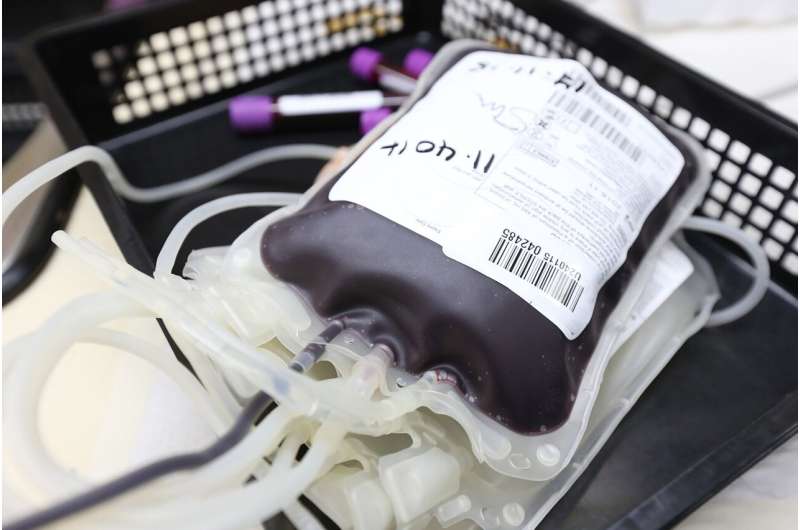This article has been reviewed according to Science X's editorial process and policies. Editors have highlighted the following attributes while ensuring the content's credibility:
fact-checked
peer-reviewed publication
trusted source
proofread
Whole blood transfusion improves survival during traumatic bleeding

Significant bleeding due to traumatic injury is the number one cause of preventable deaths in the U.S., with the majority of deaths occurring within six hours. Emerging evidence suggests that the transfusion of whole blood (blood that is not separated into parts) is associated with a survival benefit compared to the traditional use of blood component transfusion (red blood cells, plasma, and platelets) in these patients.
A new study from researchers from Boston University Chobanian & Avedisian School of Medicine demonstrates that the earlier one receives whole blood transfusion for severe traumatic bleeding, the greater chance of survival. However, if this transfusion is delayed by as little as 14 minutes after arriving at the hospital, the survival benefit is significantly reduced.
The work appears in JAMA Surgery.
"These findings may lead to clinicians and hospital systems to consider whole blood as a standard emergency transfusion product incorporated into the massive transfusion protocol," says corresponding author Crisanto Torres, MD, MPH, assistant professor of surgery at the school. "There may be a similar benefit for using whole blood transfusion at the scene of injury or during transport."
The researchers analyzed 1,394 patients nationwide who presented to the emergency department with severe traumatic hemorrhage requiring massive transfusions, including whole blood, due to their traumatic injuries. They evaluated whether the receipt of early whole blood transfusions was associated with improved survival at 24 hours and 30 days compared to delayed whole blood transfusions in severely bleeding trauma patients receiving component-based therapy massive blood transfusions. Those patients who received whole blood transfusion earlier upon their arrival to the emergency department had improved survival rates.
"Our study indicates a targeted time goal for whole blood administration within 14 minutes of hospital arrival. There is a decrease in survival probability for each minute delay in whole blood transfusion, but the most pronounced reduction in the probability of survival was seen after 14 minutes," added Torres who also is a trauma surgeon at Boston Medical Center.
More information: Association of timing to first whole blood transfusion with survival following severe hemorrhage in U.S. and Canadian adult civilian trauma centers., JAMA Surgery (2024). DOI: 10.1001/jamasurg.2023.7178




















